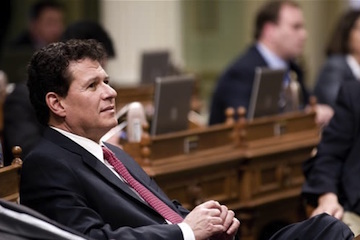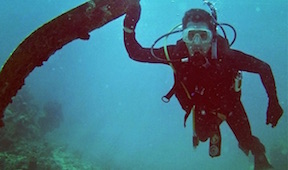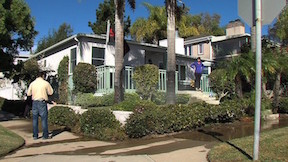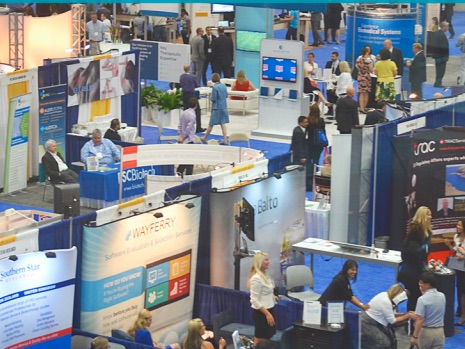Daily Business Report-Dec. 31, 2014
The report said there are 107 events forecast to be held in the center with many more expected to book in the coming months.
Convention Center Events in 2015 Expected
To Deliver $1 Billion in Regional Impact
Events held in the San Diego Convention Center in 2015 are expected to generate $1 billion in regional impact with more than $600 million in direct attendee spending and tax revenues surpassing $21 million, according to an annual forecast by the San Diego Convention Center Corp.
The report said there are 107 events forecast to be held in the center with many more expected to book in the coming months. Of these events, 66 are primary events and are expected to attract over half a million out-of-town attendees. Total expected attendance is estimated at 849,950 with current figures expected to increase over the year. This marks the center’s highest attendance since 2008 when its doors welcomed 951,618 attendees.
The annual forecast identifies 16 medical meetings in 2015 which are projected to generate $421.7 million in regional impact and draw a record in attendance. Over 161,000 people will attend medical meetings at the center and will provide a record $8.6 million in tax revenues for the San Diego region, according to the report.
Some of the major medical shows convening at the center include the American College of Cardiology, American Society of Anesthesiologists, American Society of Cataract & Refractive Surgery, American Society of Microbiology and the American Society of Nephrology. The forecast provides a detailed list of all major meetings at the facility in 2015, including medical meetings.
Since opening in November 1989, the center has generated more than $450 million in tax revenues to the city of San Diego, according to the Convention Center Corp.
15 Community College Districts to be Selected
Jan. 20 for Pilot Four-Year Degree Program
California’s Community College Board of Governors on Jan. 20 are scheduled to select 15 community college districts to participate in a pilot program to offer four-year degrees.

The proposed degree programs must meet a local work force need and not be duplicative of University of California or California State University offerings, and range from airframe manufacturing technology to other vocational programs such as dental hygiene, engineering technology, biomanufacturing, and public safety administration.
The pilot program is the result of landmark legislation — SB 850 — by Sen. Marty Block (D-San Diego).
Block said SB 850 offers California students the ability to earn a degree in workforce critical areas for $10,000 dollars, a fraction of what it costs at private for profit schools. “SB 850 students will really get a bang for their buck and will represent the diverse population of California’s Community Colleges including returning veterans from Iraq and Afghanistan,” Block said. “All are needed to keep California competitive.”
Thirty-six community college districts — half of all districts in the system –submitted letters of intent and 34 later submitted full applications for the program. Fifteen of the applying colleges will be selected for the pilot. The applications are under review and a final selection will be announced at the January meeting.
San Diego Renters Paid $8.3 Billion
In Rent in 2014 — a 6.1 Percent Jump
Renters in the San Diego region shelled out $8.3 billion in rent in 2014, or 6.1 percent more than the $7.9 billion spent in 2013, according to a Zillow rental analysis. The monthly payment change from 2013 to 2014 was $55.
Americans paid out $20.6 billion more in rent in 2014 compared to 2013, according to Zillow. Cumulately, U.S. renters paid $441 billion in rent in 2014 compared to $420 billion last year, an increase of nearly 5 percent, as both the number of renting households and the average rent rose nationally.
The Bay Area, consisting of the San Jose and San Francisco metros, saw the largest jump in cumulative rent paid in 2014, up 14.4 and 13.5 percent respectively. Rent per household in the San Jose metro rose by $197 per month, while rent in the San Francisco metro rose by $163 per month.
*********************

SDSU’s Derek Abbey Leads Mission to Repatriate
Americans Who Went Missing in World War II
Palau is a small island nation located in the western Pacific Ocean. Officially the Republic of Palau, the country’s 21,000 residents live on 250 islands that are a part of the island chain of Micronesia.
While it is famous for scuba diving and snorkeling, a major part of Palau’s history is overlooked — it was the third largest spot for American casualties in World War Two.
Approximately 2,000 Americans lost their lives in and around the Republic of Palau, second only to Iwo Jima and Okinawa. Several of these missing Americans were never repatriated, or brought back to the United States and given proper honors.
Derek Abbey — the assistant military liaison officer in San Diego State University’s Joan and Art Barron Veterans Center and a retired Marine Major — is making it his mission to repatriate each American believed to have gone missing in Palau. He joined the BentProp Project, a group dedicated to locating and assisting with identifying American prisoners of war and those who went missing in action in the Western Pacific during WWII.
“This project is so important because it completes the promise we make to the American serviceman — that if they are lost or fall during war, that we will bring them home,” Abbey said. “It’s been seven decades since WWII but the weight the families of veterans who go missing in action is passed on from generation to generation.” — SDSU NewsCenter
Click here for the full story.
**********

San Diego Hiring Staff to Enforce Water Restrictions
At the beginning of November, the city of San Diego adopted mandatory water restrictions, including limits on when sprinklers can run and when plants can be watered. But it didn’t have enough staff to proactively look for water-rule breakers.
Now that’s no longer true. In December, the city hired two provisional employees to respond to water use complaints, and is hiring a third who will start Jan. 6, said Robyn Bullard, a spokeswoman for the city’s Public Utilities Department.
The provisional employees are retired field representatives who are familiar with the job but who can only work for 90 days. Bullard said these three employees will stay with the Public Utilities Department while the city hires new field representatives and will help train the new hires.
Bullard said the new field representatives will be interviewed in January, “then they have to go through the hiring process, background check, employment check, all of that, so best-case scenario they would be in place in January.”
The city already has two field representatives and another employee who respond to water waste complaints.
— KPBS
************
New Workplace Laws Go Into Effect in 2015
A new year means a flurry of new workplace laws that go into effect.
The law that everyone is talking about the most is the one that mandates employers give at least three days of paid sick leave to all their workers.
On the wage front, California’s minimum wage stays at $9 an hour, but that will change at the beginning of 2016, when it gets bumped up to $10.
A host of new regulations makes changes to paid family leave, mandatory time to recover from working in the heat, protecting unpaid interns and protection for undocumented workers.
Here’s a summary of the state employment rules that take effect in 2015.
Mandatory Paid Sick Leave (AB 1522)
This law affects both large and small employers. It stipulates that paid sick leave should be provided to any employee who worked in California for 30 days at an accrual rate of one hour for every 30 hours worked.
Employers are allowed to limit an employee’s use of paid sick leave to 24 hours or three days in each year of employment and may put a maximum cap on total accrual of 48 hours or six days. The effective date for employers to begin providing the paid sick leave benefit is July 1, 2015.
The law requires that as of Jan. 1, employers must post the new requirements in the workplace and provide written notice to new employees at the time of being hired.
Time Off for Emergency Responders (AB 2536)
California law generally prohibits an employer from discharging or discriminating against an employee for taking time off to perform emergency duties such as a volunteer firefighter, peace officer or emergency rescue personnel.
AB 2536 clarifies that employees who are health care providers must notify their employer at the time they become designated as “emergency rescue personnel” and when they will be deployed as a result of that designation.
Protection for Unpaid Interns (AB 1443)
There has been lots of news lately about unpaid interns suing companies for doing work that most employees would be paid for. Now a new state regulation gives unpaid interns the same protections as employees when it comes to discrimination, harassment and retaliation in the workplace.
It also extends religious-belief protections and religious-accommodation requirements to anyone in an apprenticeship training program, an unpaid internship or any other program that provides unpaid experience.
Protection for Undocumented Workers Who Receive Driver’s Licenses (AB 1660)
Starting Jan. 1, undocumented residents in California will be able to apply for driver’s licenses. New legislation stipulates that employers cannot discriminate against an individual for holding a driver’s license that has been issued to an undocumented individual.
AB 1660 also provides that it is a violation for an employer to require a person to present a driver’s license, unless possessing a driver’s license is required by law or required by the employer and the employer’s requirement is otherwise permitted by law.
AB 1660 further requires any driver’s license information obtained by an employer to be treated as private and confidential.
More Protection for Undocumented Workers (AB 2751)
This legislation amends a previous regulation that protects undocumented workers from retaliation. Before, an employer was prohibited from filing a false report or complaint about an undocumented worker with the police. The new law now also prohibits filing false reports with state and federal agencies.
Non-discrimination Against Workers Receiving Public Assistance (AB 1792)
New regulation prohibits discrimination, retaliation or discharging employees receiving public assistance, which is defined as meaning the Medi-Cal program, a state insurance program for low-income families, seniors, the disabled, children in foster care and pregnant women.
Abusive-Conduct Training Mandate (AB 2053)
This new law requires that employers add abusive-conduct training to the already mandated sexual-harassment training of supervisors.
This new rule does not mean that an employee can sue for abusive conduct in the workplace unless, of course, the conduct becomes discrimination or harassment against a protected class. The law merely requires training on prevention of abusive conduct.
Increased Liability for Employers Who Contract for Labor (AB 1897)
Companies that use labor contractors or temporary staffing agencies are now liable for all wage-and-hour and safety issues. Basically, if a labor contractor fails to pay its workers properly or fails to provide workers’ compensation coverage for those employees, the “client employer” can now be held legally responsible and liable.
Rest and Recovery Periods in Hot Weather (SB 1360)
Last year, legislation was passed to amend previous legislation regarding mandated five-minute breaks for rest and recovery during hot weather. This new law clarifies that rest and recovery periods are paid breaks.
The legislation applies only to employers with outdoor places of employment, but the definition makes it unclear whether this law should be extended to truck drivers and warehouse workers unloading goods.


